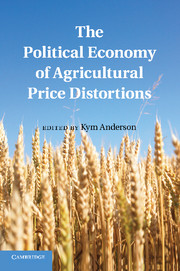Book contents
- Frontmatter
- Contents
- List of Figures
- List of Tables
- Contributors
- Foreword
- Preface
- Abbreviations and Acronyms
- PART ONE Introduction
- PART TWO CONCEPTUAL FRAMEWORKS AND HISTORICAL ORIGINS
- Part Three Political Econometrics: the Past Fifty Years
- NINE Agricultural Price Distortions and Stabilization
- TEN Why Governments Tax or Subsidize Agricultural Trade
- ELEVEN Impacts of Ideology, Inequality, Lobbying, and Public Finance
- TWELVE Agricultural Trade Interventions in Africa
- THIRTEEN Trade Agreements and Trade Barrier Volatility
- FOURTEEN Constitutional Rules and Agricultural Policy Outcomes
- Appendix: Coverage and Distribution of Assistance across Countries and Products, 1955–2007
- Index
- References
NINE - Agricultural Price Distortions and Stabilization
Published online by Cambridge University Press: 05 July 2011
- Frontmatter
- Contents
- List of Figures
- List of Tables
- Contributors
- Foreword
- Preface
- Abbreviations and Acronyms
- PART ONE Introduction
- PART TWO CONCEPTUAL FRAMEWORKS AND HISTORICAL ORIGINS
- Part Three Political Econometrics: the Past Fifty Years
- NINE Agricultural Price Distortions and Stabilization
- TEN Why Governments Tax or Subsidize Agricultural Trade
- ELEVEN Impacts of Ideology, Inequality, Lobbying, and Public Finance
- TWELVE Agricultural Trade Interventions in Africa
- THIRTEEN Trade Agreements and Trade Barrier Volatility
- FOURTEEN Constitutional Rules and Agricultural Policy Outcomes
- Appendix: Coverage and Distribution of Assistance across Countries and Products, 1955–2007
- Index
- References
Summary
This chapter describes agricultural policy choices and tests some predictions of major political economy theories, exploiting the new Anderson and Valenzuela (2008) dataset. We start by establishing three broad stylized facts: the development paradox (governments tend to tax agriculture in poorer countries and subsidize it in richer ones), the prevalence of antitrade bias (governments tend to tax both imports and exports more than nontradables), and the importance of resource abundance (governments tax more and subsidize less where there is more land per capita). We then test a variety of political economy explanations, finding results consistent with hypothesized effects of rural and urban constituents' rational ignorance about small per-person effects, governance institutions' control of rent seeking by political leaders, governments' revenue motive for taxation, and the role of time consistency in policy making.
We find that larger groups obtain more favorable policies, suggesting that positive group size effects outweigh any negative influence from more free-ridership. Some of these results add to the explanatory power of our stylized facts, but others help explain them. A novel result is that demographically driven entry of new farmers is associated with less favorable farm policies, which is consistent with a model in which the arrival of new farmers erodes policy rents and discourages political activity by incumbents. Another new result is that governments achieve very little price stabilization relative to our benchmark estimates of undistorted prices, and governments in the poorest countries have actually destabilized domestic prices over the full span of our data.
- Type
- Chapter
- Information
- The Political Economy of Agricultural Price Distortions , pp. 215 - 240Publisher: Cambridge University PressPrint publication year: 2010
References
- 7
- Cited by



